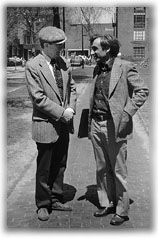Main Menu · Search ·Current Issue ·Contact ·Archives ·Centennial ·Letters to the Editor ·FAQs
 |
The Harvard Crimson has obtained a lot on Plympton Street, and construction of its new headquarters is to begin soon. The building is expected to cost approximately $40,000.
Construction begins behind the Fogg Art Museum after $5,000 is donated anonymously "to develop the land behind the building into a charming garden."
In response to a New Yorker article which "describes the lamentable decrease of hurdy-gurdies licensed by the city of New York," the Bulletin's editors cite the welcome increase in street performers and the variety of street music in Cambridge.
Construction begins on a 36-foot-long wind-tunnel in Pierce Hall. Intended "for instruction and research not only in aerodynamics of airplanes but also in the general field of wind pressures," the tunnel has an average diameter of three feet and a maximum velocity of 100 miles per hour.
The editors note the thinness of the course catalog for the coming year. "This is so partly because 30 percent of the senior members of the Faculty of Arts and Sciences and many younger instructors have left for war service...and partly because of the anticipated decline in students. Fewer than 1,000 regularly enrolled students are looked for in the College and a bare fraction of that in the Graduate Schools."
Upon the recommendation of the chairman of the University's Board of Preachers, the Harvard Corporation has voted to permit Memorial Church to be used on certain occasions for private, non-Christian ceremonies that are conducted by officials of other religions.
What begins in the Winthrop House courtyard as a prank by 20 or so Radcliffe students "hotly perpetrating the first Great B.V.D. Raid in Harvard history" (according to the Bulletin's undergraduate columnist) escalates into a riotous event involving close to 2,000 undergraduates and onlookers by the time the action reaches Harvard Square. The shouting, chanting masses finally disperse at the Radcliffe Quad. No Radcliffe women are officially penalized, but five Harvard men are arrested and spend the night in jail.
The report of a special faculty Committee on Recruitment and Retention of Faculty gives top priority to improving the starting salaries of younger tenured professors and young instructors (and titling instructors "assistant professors" instead). It also recommends that the faculty concentrate on a limited number of areas in which it can excel, rather than risk dilution of quality in attempting to cover all fields and specialties.
The Bulletin publishes "A Harvard Man's Guide to the Watergate Scandal." "Harvard men were not directly involved in the...break-in," but all alumni known to be otherwise linked to the proceedings are listed: a total of 13.
Social Sciences 2, "Western Thought and Institutions," the "last surviving example of General Education as Harvard first offered it," comes to an end as its proprietor, Eaton professor of the science of government Samuel H. Beer, shifts to half-time teaching. Beer launched the course in the fall of 1946 and revised it constantly: "[N]ot in the larger questions," he reports, "but in books, reading lists, emphasis--that's the only way it could have lasted so long."
Student activists have set up "E for D," the Endowment for Divestiture, and are urging seniors and alumni to send their class-gift contributions to its escrow account rather than to Harvard until the University adopts a policy of complete divestiture of its South African holdings or until the UN lifts its economic sanctions against that country's apartheid regime.